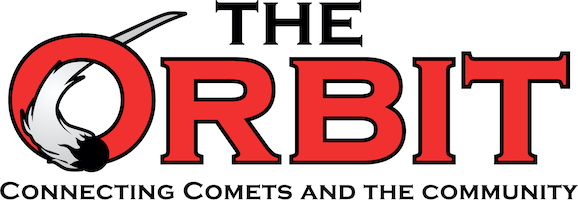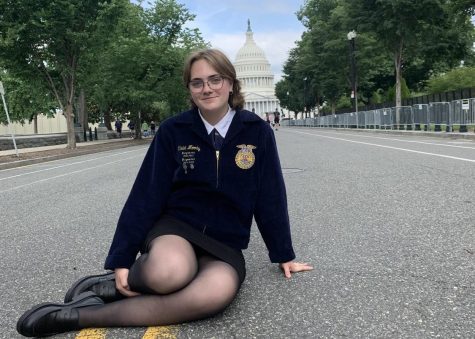Forty Years of FFA Tradition
April 5, 2021
With the 40 year anniversary of FFA being involved in the Avenue of Breeds, many reminisce on the fond memories it created.
The Jaschke family, as well as Tom Cory, former North Polk FFA advisor, look back at their involvement in North Polk FFA, as well as the Iowa State Fair.
Unaware of his connection to Avenue for most of his life, Blake Jaschke discovered his connection to the event through his late father’s colleagues and friends. His father, Terry Jaschke, being the past livestock superintendent at the Fair, started the Avenue in 1976. During his time, the animals were kept in the cattle barn located at the fairgrounds. Terry contacted breeders he knew and acquired panels from a connection at Palco Livestock Equipment. Terry then approached the Farmhouse Fraternity at Iowa State for caretakers.
Soon after the beginning of Avenue, Terry sought out a group to permanently operate the event. “Only 2 or 3 years later, Tom Cory and the NP FFA assumed the role of caretakers and it has been a wonderful tradition for the school and kids since,” responded Blake.
In 1975, a young Tom Cory had accepted the job as the agriculture teacher for North Polk. He had the job of building the FFA and Ag program from the ground up. After 6 years, he was given an opportunity to expand the Ag program. With Cory’s father being active in the Cattlemen’s Association, he had connections with the State Fair Livestock Supervisor. The supervisor wanted to turn over the event to a permanent group of hard-working people, specifically high school students. Cory’s father knew his son and the North Polk FFA was the perfect fit.
Cory ultimately took this event for the FFA kids.“I was looking for opportunities for students to have more experiences.”
Located at the southwest corner of the annex near Stockman’s Inn at the State Fair, the North Polk FFA began the long-lasting tradition of Avenue of Breeds.
“With the first Avenue, we had 48 animals, and it started in 1981…After we had those first 48 animals, we mainly had cattle, hogs and sheep…After about two or three years, we had gone from 48 different animals to roughly 50 or 60 animals.” Said Cory
With the increase of animals, the students were in need of a larger space. In the mid-80s, hog showing rates were lower than usual, creating space for the Avenue. The FFA moved across the road to the swine barn, which became their permanent space.
A lot of people apart from the swine building were wary of having that many animals around their animals. While they looked at it in a negative way, it helped North Polk FFA tremendously. “As it turned out, a lot more people came through that barn,” replied Cory.
By the time 1995 hit, 14 years after they took up Avenue, the FFA had expanded to 130 different species of animals.
Jaschke Family Secrets
Blake Jaschke and his daughter Lauren had no idea that his father, Terry Jaschke, was the founder of the Avenue of Breeds.
Blake explains how this makes his connection to Avenue of Breeds much stronger. “My father started the Avenue of Breeds in 1976. Now, I see my daughter working at something her grandfather started. Lauren has never met her grandfather, as he passed away unexpectedly in 1993.”
While Blake was not very active in FFA, he was active within 4-H. He showed sheep and was also active within school sports. With his part-time jobs with local farmers, he did not have a lot of time for other activities. Blake is now a pilot.
Lauren has also explained how she feels closer to her grandfather when she is at Avenue. “I can connect with someone I have never met. I hear stories about his work with 4-H, livestock and the fair. By participating in the Avenue, I can help keep my grandfather’s work going and allow many other people learn about livestock they might not otherwise see.”
Lauren has been active in FFA all four years of high school. Her favorite part of the Avenue is, “being able to do something my grandfather started. I never got to meet him but I know he would be proud that I am helping at the Avenue and involved in agriculture. Being active in the Avenue of Breeds has allowed my family and I to spend time honoring and remembering Terry.”
Avenue: Behind the Scenes
Although the North Polk FFA makes the Avenue look seamless, there is a lot of sweat that goes on behind the scenes.
Planning for the Avenue typically started in January. At the very beginning, students would talk to relatives asking them to bring their animals over for the days of the Avenue. The FFA chapter found that farmers and ranchers were initially hesitant to bring their animals for an extended time to the Avenue, especially in the care of highschoolers.
“A lot of the breeders walked through there [Avenue], observing it. We would tell them if you don’t want to bring an animal this year, at least walk through the Avenue and see how we care for them, and see if that meets your specs,” said Cory.
The chapter would also contact breed associations for agricultural literature to provide to people going through the Avenue. The FFA also received some Heritage sheep breeds in the 80s to have in the Avenue.
During a normal day, the FFA members would wake up around five in the morning to start morning chores. They would work until 8:30 a.m to make sure pens were cleaned, animals were fed and the area looked presentable. Cory admits to being a stickler on presentation when it came to Avenue.
Cory talks about the creative way he knew students were doing chores correctly. “So being pure white [Charolais] that was our check for how the kids were doing chores. If that animal starts getting dirty then we knew that they weren’t doing the cleanup during the day, and they weren’t doing the morning cleanup. I use the Charolais as my key to knowing if those kids were really cleaning all those pins out or not.”
The students were required to groom and walk all of the docile animals, clean the pens and feed the animals correctly. Feeding was one of the most challenging and important parts of chores. Many animals had specialty foods specific to their diet that could make any other animal ill.
“They need to see what having to go the extra mile, to make something look good, was all about,” responded Cory.
Tom Cory’s Legacy
When Cory was not busy with the Avenue, he was figuring out other ways he could help his students succeed.
Cory was also trying to find a way to help his students gain experience, as well as earn money for higher education.
“I set up a point system, and every point was worth a penny. By the time the students graduated that was collected over four years, if they stayed with the program, then their senior year, there was a scholarship check that was written out to them for college or books or anywhere else they needed.” Ways that the students could earn these points was volunteering at the Avenue or farming at the 50 acres that were close to the school.
Over the 20 years that Cory was in the North Polk Ag program, he gave out a total of $46,000 in scholarship money. He used this method as a way to motivate kids to work.
Cory also had another scholarship program for around 5 years at North Polk. He created an adult scholarship for adults in the community. “We would give a $500 scholarship to any person who had been out of school at least five years, and they were going back to school to get trained or to further their education.”
A lot of people were active within, and supportive of the FFA and Ag program because of all the opportunities it gave to the students as well as regular community members. Many of his students set their roots in the North Polk district and their children continue to support the FFA.
“We tried to tie the community in with the program. People bought into the program because they knew the program was theirs.”
Modern Day Avenue
There is not much that has changed since Cory left North Polk FFA.
Chairmen are still elected from each grade to plan the event and contact breeders. The Avenue has over 120 animals that have to be taken care of twice each day. Chore times and animal care have been the same since the beginning.
Present-day adviser Jessica Hebert has to make sure that all of her students are prepared to volunteer at the Avenue. “Students attend an animal handling workshop during the summer. [They] learn about animal behavior, putting on a halter, tying knots, and leading animals.”
FFA members also have to be ready to have a positive attitude for the people that circle through the event. “Members spend the day educating the public as they come through about the various animals- how to care for them, their purpose, and the importance of agriculture.”
Power of the Press (or Social Media)
North Polk FFA is hitting their 40th anniversary running Avenue.
Many alumni, parents and students of North Polk FFA, as well as concerned citizens, took to Facebook and other social media outlets to voice their concern of the possible termination of the Avenue.
With needed budget cuts, the Iowa State Fair Board considered canceling the Avenue.
Many contribute this to a Facebook group called “Renew the Avenue,” as well as people that directly messaged the fair board asking them to reconsider their decision.
In this group, members shared pictures of the past Avenues as well as talked about the opportunities it gave to the FFA students as well as the educational opportunities it gave to the people walking through.
Many, like Lauren Jaschke, took this possible decision to heart. “I felt disappointed that it was cut from the fair. The news was very devastating for me, it’s something that I can remember my grandfather by, and now it’s potentially gone forever. But I also feel saddened that my younger brother can not participate along with all other future North Polk FFA members and the fact that they would have missed out on this experience. It was hard on all past, present and future members, many North Polk FFA members have parents that participated in the Avenue during their high school years. Those families also would have been hurt in this decision that unfortunately had to be made.”
Cory took the possible termination with a more optimistic view. He hoped that this negative event could lead to the FFA coming up with new ways to make their mark in the Central Iowa area.
Cory speaks directly to North Polk FFA saying, “ North Polk got a lot of visibility, they have a lot of stature within the FFA community, as well as the state. That’s something that needs to be built on and continued to be built on. They can’t rest on the morals, they’ve got to always find new territory to conquer.”
At the March 29 North Polk FFA meeting, – Hebert updated the disappointed students that the Avenue would no longer be terminated. Although this new development is thrilling to think about, the chapter has a lot of work ahead of them, in a very small time span.
Lauren was not anticipating the exciting news, “I was very shocked when Mrs. Hebert told us at the meeting. I did not see this coming, I don’t think very many people did. After the meeting one of the first things I did was call my father. I told him the news and I think he was shocked as well. I think it is great that the Avenue is coming back, but I know many changes will need to be made. We are behind on preparations and still know very few details. But I am mostly anxious to see how this year and future years are for Avenue.”
Cory is enthused that the students will be able to enjoy this valuable opportunity again. “It has always provided excellent leadership training for young people. The Avenue can become a great way for young people to connect with adults who have a wealth of knowledge and experience.”


